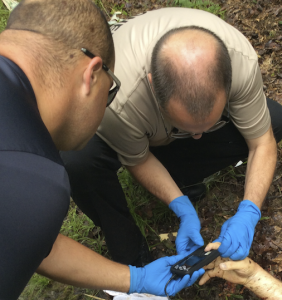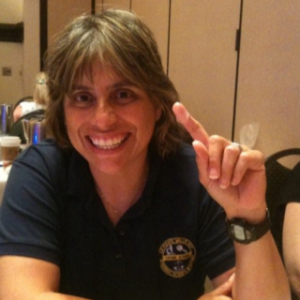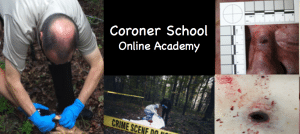 What is a Medicolegal Death Investigator?
What is a Medicolegal Death Investigator?
The role of the medicolegal death investigator is to investigate any death that falls under the jurisdiction of the medical examiner or coroner, including all suspicious, violent, unexplained and unexpected deaths. The medicolegal death investigator is responsible for the dead person, whereas the local law enforcement jurisdiction is responsible for the scene. The medicolegal death investigator performs scene investigations emphasizing information developed from the decedent and determines the extent to which further investigation is necessary. Medicolegal death investigators should have a combination of education and skills encompassing areas of medicine and law.
- Who can become a Medicolegal Death Investigator?
There are no formal requirements to become a medicolegal death investigator. Each coroner and medical examiner office has different hiring practices. A medicolegal death investigator must be knowledgeable of local, state and federal laws. In addition, a medicolegal death investigator must be the most medically knowledgeable person at the scene of the crime to determine if further investigation is necessary. - Do I have to have a degree?
There are no formal educational requirements specifically for medicolegal death investigation. Any degree program dealing with Forensic Science, Natural science, Anthropology, Nursing, or any other medically related field would be useful. There are several established training courses available throughout the country that teach the basic information needed in order to perform a thorough, competent medicolegal death investigation. - How much money will I make as a Medicolegal Death Investigator?
An investigator’s salary will be determined by the jurisdiction and amount of experience the medicolegal death investigator has. Salaries and benefits vary throughout the United States.
What does a Forensic Science Technician do?
At a crime scene, a forensic science technician will typically do the following:
- Walk through the scene to determine what and how evidence should be collected
- Take photographs of the crime scene and evidence
- Make sketches of the crime scene
- Keep written notes of their observations and findings, such as the location and position of evidence as it is found
- Collect all relevant physical evidence, including weapons, fingerprints, and bodily fluids
- Catalogue and preserve evidence before transferring it to a crime lab. Forensic science technicians may use tweezers, black lights, and specialized kits to identify and collect evidence. In addition to processing crime scenes, they may also attend autopsies.
In laboratories, a forensic science technician will typically do the following:
- Identify and classify crime scene evidence through scientific analysis
- Explore possible links between suspects and criminal activity using the results of chemical and physical analyses
- Consult with experts in related or specialized fields, such as toxicology, about the evidence and their findings
- Reconstruct crime scenes based on scientific findings
Forensic science technicians reconstruct crime scenes by carefully studying information gathered by investigators and conducting scientific tests on physical evidence. For example, lab technicians may look at photographs of blood splatter patterns and conduct ballistics tests on bullets found at the crime scene to determine the direction from which a shot was fired.
Forensic science technicians who work in laboratories use chemicals and laboratory equipment such as microscopes when analyzing evidence. They also use computer databases to examine fingerprints, DNA, and other evidence collected at crime scenes in order to match them to people and things that have already been identified. Most forensic science technicians who perform laboratory analysis specialize in a specific type of evidence analysis, such as DNA or ballistics.
All forensic science technicians prepare written reports that detail their findings and investigative methods. They must be able to explain their reports to lawyers, detectives, and other law enforcement officials. In addition, they may be called to testify in court about their findings and methods.
What is the workplace of a Forensic Science Technician like?
Forensic science technicians must travel to different locations around a city or region because crimes can occur anywhere. Crime scene investigation can be distressing and unpleasant because investigators see many disturbing sights. Crime scene investigators work staggered day, evening, or night shifts and may have to work overtime because they must always be available to collect evidence.
This Episode’s Guest
 Terri Armenta
Terri Armenta
 Coroner School™
Coroner School™

 The Death Investigation Training Academy was founded to play an integral role in the death investigation community. The need for quality accredited training is in short supply and high demand. Using a combination of class room training, live on site scenario exercises, and web based training, the Death Investigation Training Academy is filling the need of 21st century investigators.
The Death Investigation Training Academy was founded to play an integral role in the death investigation community. The need for quality accredited training is in short supply and high demand. Using a combination of class room training, live on site scenario exercises, and web based training, the Death Investigation Training Academy is filling the need of 21st century investigators.

coroner,police training, darren dake,sheriff,deputy,coroner association,murder scenes,auto fatalities,csi,first responders,autoerotic fatalities,become a coroner,forensic science crime scene investigation,forensic science crime,scene investigator,forensic training,forensics training,how to be a crime scene investigator,how to become a death investigator,how to become a medical examiner,how to become a medical examiner investigator,medical examiner investigator training,medical investigator training,medicolegal death,medicolegal death investigator training,murder scenes,pictures of murder scenes,murder,real murder crime scenes,traffic deaths,traffic fatalities,what does it take to be a coroner,what does it take to be a criminal investigator,firefighter,fire training,firefighter training,autoerotic fatalities,become a coroner,coroner information,crime scene clean up training,crime scene cleaning training,crime scene cleanup training,crime scene investigation,crime scene investigation classes,crime scene investigator courses,crime scene investigator school,crime scene jobs,crime scene photography,crime scene photography training,crime scene technician,crime scene technician training,crime scene training,criminal investigation,criminal investigator,criminal justice,criminal justice forensic science,criminal justice forensics,criminal scene investigation,death crime scenes,death investigation training,death investigator training,death investigators,forensic death investigator,forensic investigator,forensic photography, crime scene clean up,crime scene bio-hazard, using plants in criminal investigation,forensic botany,dr.jane bock,death investigator magazine,dr judy melinek,badge of life,american college of forensic examiners,acfei,american board of medicolegal death investigators,abmdi,matthew lunn,underwater crime scene,mike berry,online learning,lopa,cultural diversity,anger de-escalation, coroner school,
6 comments on “How to Become a Death Investigator”
Leave a Reply
You must be logged in to post a comment.



Thanks for doing this. Being a CSI has always been my dream that I thought was out of reach for me. Thanks for all the information. I’m going to try my best to find out how to do this in Louisiana (maybe I need to move haha). Any advice is 100% appreciated. Life’s too short….I want to make my dreams come true 🙂 Thanks again! -Megan
Hi Megan – Welcome to the Coroner Talk community.
Hello! Thank you. Happy to be here 🙂
I was wondering how things were moving along for you? I am in a similar situation and having a hard time finding hands on experience. I have come inches from actually landing my dream job as an ME here in Atlanta but I keep missing the mark due to lack of medical hands on experience. I agree with you any advice is appreciated. Darren, maybe you have some ideas for us.
Regards – Jodi
I hear this problem a lot. Many bigger C/ME office want the applicant to have “hands-on” experience but getting that experience is not easy. It is very much the chicken or the egg parable. Let me ask because I do not know, does the ME office you are trying to work for in Atlanta offer an intern or volunteer position so you can get some experience? If not, and most do not, is part of the problem nationwide. We are loosing and not attracting what might be fantastic investigators because we as a field of science are blocking our own way much of the time. If your local ME does not offer that look around your 100-mile radius and see if you can find one that does.
All true, I was told they want to put together an intern or volunteer type training program but I think funds might be the problem (just a guess) I also, think they partner with Emory Hospital medical students. I have had interviews with the Fulton Co. medical staff for the past 2 years in a row and they speak very highly of me and said I was 4th on the list of applicants and they continue to encourage me to keep at it. The 2 people they hired were also former ME staff. My personal feeling is they left for a reason and why not take new people and mold them into great MEs I am willing to be the low woman on the totem pole and work all the “bad” shifts. They were also very impressed with all the courses I completed with DITA. I am looking now for “hands on” boots camps that won’t break the bank. I haven’t had much luck. I really don’t know where to go to get the medical side which is the only thing I am lacking. Please Please keep this topic on your agenda when your training on site. The south is particularly hard as I have found MEs aren’t utilized much. Thank you Darren for all your advice, training courses and support.